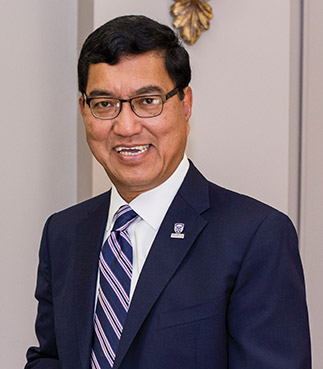The million-dollar question
 CREDIT: "XIAO" BY COMMS STAFF ON FLICKR (CC BY-NC-ND 2.0) / CROPPED & DESATURATED
CREDIT: "XIAO" BY COMMS STAFF ON FLICKR (CC BY-NC-ND 2.0) / CROPPED & DESATURATEDWestern University President, Amit Chakma, was among the long list of public sector employees, except his salary far exceeded the majority making close to $1 million in 2014.
For most students in college and university, the extent of the president’s contribution to your education consists of delivering an uninteresting speech on your first and last day at the institution. The recent outrage over Western University’s president, Amit Chakma, receiving almost $1 million for his work at the university in 2014 should be a catalyst for a discussion about how professors are compensated.
In my time as a student in London, the majority of my professors had a second job to supplement their income. Many are paid only for their hours in the classroom, not the time spent preparing lessons plans. The idea that an academic has the right to take a year off while still receiving their salary is already luxurious to say the least. But to allow them to collect double their salary for foregoing the year of leave is indefensible. Chakma appears to be well aware of this, given his reluctance to address the issue after it came to light following the release of the 2014 Ontario Sunshine List.
There is some legitimacy to the argument that a university president should be compensated well, but it’s irrational to suggest a direct correlation between salary and performance. Nobody would suggest that doubling Chakma’s salary would make him twice as good at his job, so it stands to reason that cutting it wouldn’t necessarily have a negative effect either. It’s hard to think of any rationale that would justify paying the president of a university more than the leader of the entire country.
Given the provision that allows the university’s president to take a paid leave of absence, it begs the question of who fills the role in his absence. If the institution is capable of operating without its president for an entire year, perhaps the person running it in the interim should be offered the top job for half of the president’s salary. For in excess of $200,000 per year, there would be no shortage of applicants.
It’s difficult to assess whether Chakma’s decision to forego the sabbatical was due to the double pay clause or whether he only became aware of the option once the decision had been made. Until the president is willing to provide the public with his own account of the event, individuals are left to draw their own conclusions.
Critics calling for Chakma’s resignation should be equally focused on the administration that allowed him to take the double pay. The purpose of offering paid leave is to allow for academic pursuits free from the administrative duties associated with the position of president of the university. Giving the option to receive twice the annual salary for remaining in the role defeats the purpose of the provision. Instead of providing the academic freedom to pursue research, it functions as golden handcuffs. The pursuit of academia would be an asset for the university, foregoing that pursuit benefits only the individual.
Editorial opinions or comments expressed in this online edition of Interrobang newspaper reflect the views of the writer and are not those of the Interrobang or the Fanshawe Student Union. The Interrobang is published weekly by the Fanshawe Student Union at 1001 Fanshawe College Blvd., P.O. Box 7005, London, Ontario, N5Y 5R6 and distributed through the Fanshawe College community. Letters to the editor are welcome. All letters are subject to editing and should be emailed. All letters must be accompanied by contact information. Letters can also be submitted online by clicking here.













